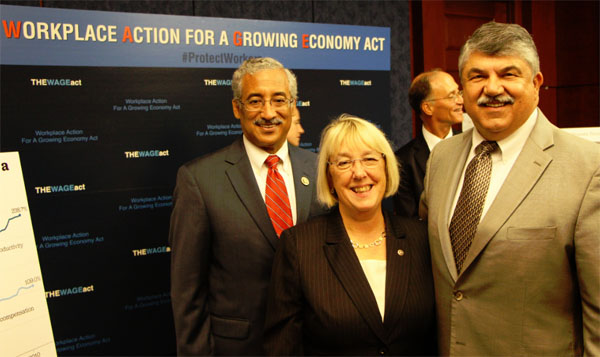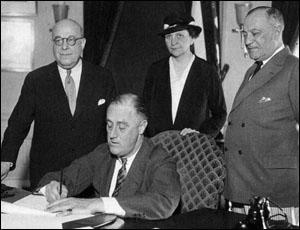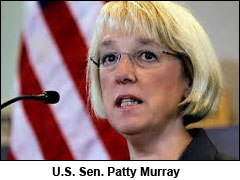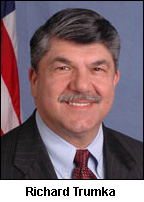NATIONAL
Murray introduces WAGE Act to update, strengthen labor laws

UPDATE (Sept. 17, 2015) — Above is a photo of Rep. Bobby Scott, Sen. Patty Murray and AFL-CIO President Richard Trumka from Wednesday’s press conference introducing the WAGE Act. And here is some of today’s media coverage:
► From AFL-CIO Now — Introducing the WAGE Act to strengthen the rights of working people — Today, members of Congress, led by Sen. Patty Murray (D-Wash.) and Rep. Bobby Scott (D-Va.), proposed the Workplace Action for a Growing Economy (WAGE) Act, legislation designed to strengthen protections for working people who join together to make positive change at work and make sure corporations that violate working people’s rights face real consequences.
► From the Hill — New legislation aims to protect union organizers — “Today’s laws that are designed to protect people at work don’t have enough teeth to hinder bad corporate behavior,” said AFL-CIO President Richard Trumka. “Simply put, employers are constantly breaking the law because there’s no incentive for them not to.”
 ► In today’s Washington Post — Labor law has been frozen for 60 years. Democrats are trying to crack it open. — The American workplace has changed a whole lot over the past half century. But the major law that governs how workers and employees interact — the National Labor Relations Act — has been essentially frozen since 1947, when the law was reformed to constrain worker power. According to many scholars, that’s one of the major reasons behind the steady decline in union density that characterized the second half of the last century. There have been many attempts to tilt the law back in the favor of workers, to no avail. Today, however, liberal legislators are trying to make the law a tool for collective action again — putting the issue squarely in the 2016 presidential conversation.
► In today’s Washington Post — Labor law has been frozen for 60 years. Democrats are trying to crack it open. — The American workplace has changed a whole lot over the past half century. But the major law that governs how workers and employees interact — the National Labor Relations Act — has been essentially frozen since 1947, when the law was reformed to constrain worker power. According to many scholars, that’s one of the major reasons behind the steady decline in union density that characterized the second half of the last century. There have been many attempts to tilt the law back in the favor of workers, to no avail. Today, however, liberal legislators are trying to make the law a tool for collective action again — putting the issue squarely in the 2016 presidential conversation.
► From Politico — The power of a lawsuit — Admittedly when Democrats introduce legislation in Republican-controlled legislative bodies, it’s not normally considered all that newsworthy. There’s little reason to assume it will go anywhere in Congress. But the idea it contains — essentially, a civil right to unionize — is a powerful one that could help jump start an important discussion in the presidential campaign, and at the state and local level.
► From Huffington Post — Democrats want to make labor organizing akin to a civil right
► In The Guardian — New pro-union bill to serve as litmus test for 2016 presidential candidates — As Scott Walker bashes unions on the campaign trail, Democrats in Congress sponsor the Wage Act, offering new protections for workers seeking to unionize.
 (Sept. 16, 2015) — This afternoon, U.S. Sen. Patty Murray (D-WA) and Rep. Robert C. “Bobby” Scott (D-VA) will unveil the Workplace Action for a Growing Economy (WAGE) Act, new legislation to strengthen protections for workers who want to raise wages and improve workplace conditions.
(Sept. 16, 2015) — This afternoon, U.S. Sen. Patty Murray (D-WA) and Rep. Robert C. “Bobby” Scott (D-VA) will unveil the Workplace Action for a Growing Economy (WAGE) Act, new legislation to strengthen protections for workers who want to raise wages and improve workplace conditions.
At a press conference where they will be joined by AFL-CIO President Richard Trumka and Ross Eisenbrey of the Economic Policy Institute, Murray and Scott will highlight how the WAGE Act would help ensure workers are able to have a voice in the workplace and would crack down on employers who break the law when workers exercise their basic right to collective action.
“Unfortunately, when workers want to improve working conditions, some companies do everything they can to prevent workers from having a voice in the workplace. And our labor law lacks the remedies that would discourage these unlawful tactics,” said Sen. Murray in prepared remarks. “That’s why the WAGE Act is so important. It would strengthen protections for all workers — whether they are union members or not. And it would provide the same tools found in other employment and civil rights laws.”
The WAGE Act would increase penalties against employers who fire or retaliate against workers who are exercising their right to collective action, end perverse incentives for employers to interfere with workers’ rights by establishing civil penalties for employers that commit unfair labor practices or prevent free and fair elections, and requires employers to post notices informing workers of their rights under the National Labor Relations Act. (Download a WAGE Act fact sheet for more details.)
 “The WAGE Act is a critical first step in addressing both a changing economy and labor laws that have failed to keep up with a changing workplace,” Trumka said. “The economy is a set of rules that for too long have been rigged against working people. The WAGE Act is about changing these rules — for all working people, whether they’re in a union or not. It’s a bold first step and a key thread to the larger fabric of the raising wages agenda.”
“The WAGE Act is a critical first step in addressing both a changing economy and labor laws that have failed to keep up with a changing workplace,” Trumka said. “The economy is a set of rules that for too long have been rigged against working people. The WAGE Act is about changing these rules — for all working people, whether they’re in a union or not. It’s a bold first step and a key thread to the larger fabric of the raising wages agenda.”
The WAGE Act faces an uphill battle with both houses of Congress controlled by Republicans who have been hostile to legislation empowering workers to win higher wages and better benefits. Instead, this Congress has been characterized by Republican infighting and an inability to pass the appropriations bills necessary to avoid government shutdowns.
“This is the kind of legislation we should be working on in Congress,” Murray said. “Instead, some Republicans seem more interested in pushing us toward another crisis than working with us to help workers and the economy. But I am going to be fighting for this, and many more pieces of legislation, that help make sure our country, our government, and our workplaces work for all families, not just the biggest corporations or the wealthiest few.”





